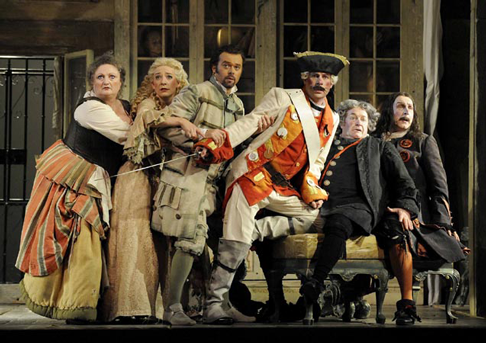06 Oct 2008
The Barber of Seville — English National Opera, London Coliseum
It can be difficult to inject life into a production which has been a staple of a company’s repertoire for over twenty years.

It can be difficult to inject life into a production which has been a staple of a company’s repertoire for over twenty years.
Jonathan Miller’s durable production of Rossini’s most popular opera has returned almost every second season since its 1987 première, and though it has its longueurs (as does the opera itself) the thing that has kept it fresh is its straightforward attractiveness and humour. The company’s casting department has a large part to play in its enduring success, too – Tanya McCallin’s straightforwardly functional period set is normally populated by a combination of company veterans and fresh and promising young artists, with the result that it always feels like a successful ensemble piece with an eternal spark of life.
One thing which wasn’t new was Andrew Shore’s Bartolo; he has become a fixture in this production, to the extent that on the advertisement posters scattered around London’s transport system it is his name alone that is emblazoned next to the title of the opera. His gift for delivering words when singing in English is quite unequalled, and he plays the staging’s physical comedy to maximum effect. Sometimes in the past this has resulted in an imbalance, because with Shore as Bartolo it takes a particularly strong and characterful Rosina to convince the audience that she could credibly get the better of him. Fortunately the young Swedish mezzo Anna Grevelius was his ideal foil; a beautiful girl who always had a glint in her eye, and whose warm and rounded tone and lovely sense of bel canto line were combined with pinpoint accuracy of pitch and diction.
The Canadian tenor John Tessier, making his house début, made an extremely personable and youthful Almaviva. If he was rather superficial, this was the production’s idea rather than his own; Rosina is seduced more by the idea of being swept off her feet by a romantic young man than the reality of what life might actually be like afterwards. He showed off his lovely light, easy and secure tone with some stratospheric ornamentation, though conductor Rory Macdonald would have done well to give him a little more space to prevent an occasional stridency and unevenness which crept into some of his fastest runs. He demonstrated a gift for comedy and character acting with both his disguises, and served equally well as an ardent romantic hero when required.
Of the major principals, only Garry Magee’s Figaro disappointed; the eponymous barber needs charisma and charm, and his entrance aria should be filled with unshakeable masculine confidence and panache, but often it felt as though he was just singing the notes.
 Jennifer Rhys-Davies (Berta) Anna Grevelius (Rosina) Garry Magee (Figaro) John Tessier (Almaviva) Andrew Shore (Doctor Bartolo) Brindley Sherratt (Don Basilio)
Jennifer Rhys-Davies (Berta) Anna Grevelius (Rosina) Garry Magee (Figaro) John Tessier (Almaviva) Andrew Shore (Doctor Bartolo) Brindley Sherratt (Don Basilio)
Brindley Sherratt’s oleaginous Don Basilio was a sinister delight, Julian Hubbard’s Fiorello was superbly sung, while Jennifer Rhys-Davies and Peter Kerr offered solid if slightly nondescript support as Berta and Ambrogio.
Two factors put this into a class above what could have been a run-of-the-mill revival of an ENO warhorse. Firstly it would appear that the original director, Jonathan Miller, might have had more of a hand in this revival of his than in any earlier run I can remember; various long-absent details have been restored, while much of the sillier business which the staging has acquired over the years, such as Ambrogio’s constant yawning and Berta’s incurable sneezing, has been mercifully consigned to the dustbin. More to the point, the cast had a real chemistry together, filled the stage with life, and looked and sounded as though they were really enjoying themselves.
Ruth Elleson © 2008